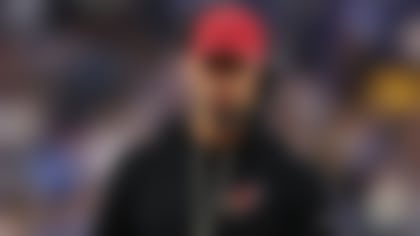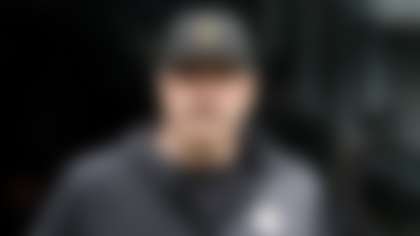The tsunami-like waves that arose from the Milwaukee Bucks' wildcat strike of Game 5 of their NBA playoff series with the Orlando Magic on Aug. 26 spread quickly across the sporting landscape, even reaching the shores of the NFL, where several high-profile players privately expressed to me a desire to join their athletic counterparts by sitting out a regular-season game to accelerate the fight against systemic racism and police brutality.
And yet, as the NFL prepares to kick off the season Thursday night in Kansas City, where the Chiefs will host the Houston Texans, the likelihood of such a thing occurring appears remote. The primary reason is that the league's owners have done a 180 from two years ago, when NFL Commissioner Roger Goodell said they voted unanimously (with one abstention, though two owners ultimately said they abstained) to prohibit players from publicly kneeling or protesting during the national anthem.
Some players I've spoken to interpreted that vote as owners placing greater value on their pocketbooks than a Black life, which created a virtual wall between the sides. But the climate is dramatically different today. In the last few months alone, we've seen Goodell respond to a public request from high-profile Black players -- quarterbacks Patrick Mahomes and Deshaun Watson among them -- by publicly stating that Black Lives Matter and that there would be no NFL without Black players. We've seen owners and teams speak out against racism and in support of police accountability, including a statement by the Ravens calling for the police who shot Breonna Taylor and Jacob Blake to be arrested. We've seen the league promote a drive for voter education and voter registration, as well as commit to using on-field signage and video productions to highlight players' personal stories and what's being done to create positive change. Also, players will be allowed to wear helmet decals honoring the victims of social injustice.
All of this has occurred in the relative blink of an eye, but the willingness to now publicly join with players to create change has helped tear down that virtual wall and create a partnership that dramatically reduces the likelihood of players boycotting a game.
"Roger said it, and I think he's right on it -- I think we've evolved on the issue," said Packers president and CEO Mark Murphy, whose team also committed to several initiatives to create change. "We realize we should have listened maybe a little more carefully to players in the past. In my mind, players are crucial to us, and supporting them is a top priority. I think a number of us feel -- and this is the way I feel, and it's trite -- but you want to be on the right side of history out of this. No question in my mind it's the right thing now."
The players who privately expressed to me two weeks ago a desire to possibly boycott Week 1 of the NFL season were primarily frustrated with the lack of accountability within police departments. Days earlier, Jacob Blake had been shot in the back multiple times by a Kenosha, Wisconsin, police officer, leaving Blake partially paralyzed, according to his family; the shooting sparked multiple pro athletes, including the NBA's Bucks, to sit out games in protest.
One of the players with whom I spoke at the time said he had been crying for three days. He struggled with how all the public protests and uncomfortable conversations had yet to stop the shooting and killing of unarmed Black people or resulted in the convictions of officers involved. His pain was shared among many players, some who spoke out on social media or to the press, and others who lent their voice in team meetings. The Lions were the first to cancel practice so everyone could process the issue internally. Other clubs followed the next day. And while the idea of boycotting a regular-season game was brought up during many conversations -- quarterback Russell Wilson told a radio audience that the Seahawks would not have played that week if there had been a preseason game, while Giants players Saquon Barkley and Sterling Shepard publicly mused about sitting out a regular-season contest -- the idea lost steam the farther the players got from the most recent shooting.
"That is a question that I think about, too," 49ers defensive lineman Arik Armstead said of the impact of boycotting a game. "But when I think about that question, it's not just about the act of us sitting out the game, it's about what is trying to be accomplished. If there was going to be immediate change from sitting out a game, no-brainer, I'm all for it because I'm definitely all for change. And when you're talking about a game versus affecting and changing lives in our society for the better, that's a no-brainer. I just would want to know what the plan is, what the end game is, what's the goal we're hoping to achieve with that."
Armstead and his 49ers teammates have in the meantime joined with team ownership to continue to push for change. San Francisco players had the final vote in how $1 million in team grants would be divided among nine nonprofit organizations working toward positive social change. Players on other teams also have joined with their club management to address social justice issues. Identifying the problem is one step; finding the best solution for change is another.
"That's a complex answer," Titans safety Kevin Byard said. "We do want change, and it obviously starts with voting and getting the right people in power and the right laws on to Congress and put in place to where we have protections when it comes to police brutality and things like that. But I do think that this is something that my generation might not even live to see [come to fruition]. It's going to take time. You're talking about 300 years of slavery, 100 years of Jim Crow laws that really was only 40 or 50 years ago.
"I do think we're headed in the right direction and taking the necessary steps; and when you're talking about the entire sports world -- the entire world in general -- being woke and actually moving in the right direction, the vibrations that everyone is putting out there as far as what they're standing for and their message is positive. But I do think it's going to take time. I don't think Jacob Blake or George Floyd is going to be the last time we see [an unarmed] Black man [shot or killed] by a police officer. That's the reality of it. If we think that just because we made a statement out there things are going to easily change, it's something we've got to keep hoping for and praying for and working and moving in the right direction."
As with any issue, there will be players who have different opinions about the best path forward. But as long as the players feel owners are moving with them, even if in the shadows, a boycott seems unlikely.




